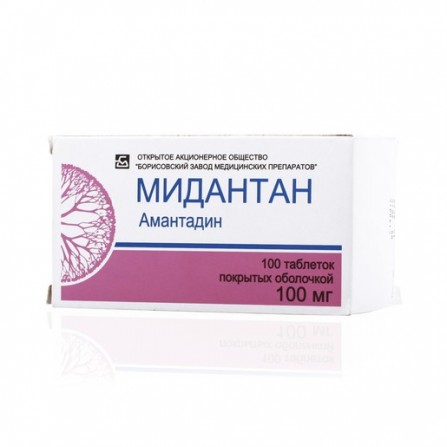More info
Active ingredients
Amantadine
Release form
Pills
Composition
1 tablet contains: Active substance: amantadine sulfate 100 mg. Auxiliary substances: microcrystalline cellulose, potato starch, gelatin, lactose monohydrate, povidone, talc, magnesium stearate, colloidal silicon dioxide, sodium croscarmellose, titanium dioxide, a blending agent and a body layer.
Pharmacological effect
Anti-Parkinsonian drug, tricyclic symmetric adamantine. Blocks glutamate NMDA receptors (including in the substantia nigra), thereby reducing the excessive stimulating effect of cortical glutamate neurons on the neostriatum. developing on the background of insufficient release of dopamine. Reducing the flow of ionized Ca2 + into neurons reduces the possibility of their destruction. Mostly affects stiffness (rigidity and bradykiesia).
Pharmacokinetics
After oral administration is well absorbed in the digestive tract. Cmax in plasma after 5 h; T1 / 2 amantadine sulfate - 12-13h, amantadine hydrochloride - 30 hours. Excreted by the kidneys unchanged.
Indications
Parkinson's disease, parkinsonism syndrome (rigidity, tremor, hypokinesia). Neuralgia with shingles caused by Varicella zoster virus. Prevention (including in conjunction with vaccination) and treatment of influenza A.
Contraindications
- liver failure; - chronic renal failure; - psychosis (in history); - thyrotoxicosis; - epilepsy; - angle-closure glaucoma; - prostatic hyperplasia; - arterial hypotension; - heart failure II-III stage. - excitation; - preddeliry; - delirious psychosis; - concomitant use of triamterene and hydrochlorothiazide; - pregnancy (I term); - lactation period; - hypersensitivity.
Precautionary measures
Orthostatic hypotension, allergic dermatitis, pregnancy (II and III trimester), advanced age, alcoholism, mental disorders (including a history). When renal dysfunction, reduce the dose and increase the intervals between doses: when the glomerular filtration rate is 80- 60 ml / min - 100 mg every 12 hours, 60-50 ml / min - doses of 200 mg 100 mg alternate every other day, 30-20 ml / min - 200 mg 2 times / week, 20-10 ml / min - 100 mg 3 times / week, less than 10 ml / min - 200 mg 1 time / week and 100 mg every second week.
Use during pregnancy and lactation
In pregnancy, the use of amantadine is possible only under strict indications and under the supervision of a doctor. If necessary, use during lactation should decide on the termination of breastfeeding.
Dosage and administration
Assign inside after eating. Accept, starting with 0.05 - 0.1 g, first 2 times, then 3-4 times a day. Daily doses of 0.2 - 0.4 g. The duration of the course of treatment is 2-4 months. The drug is prescribed independently and in combination with other anti-Parkinsonian drugs: anticholinergics and L-dopa. The maximum dose: when taken orally - 0.6 g / day.
Side effects
On the part of the nervous system: motor or mental agitation, convulsions, headache, dizziness, irritability, insomnia, tremor, mental disorders accompanied by visual hallucinations. On the side of the cardiovascular system: heart failure, tachycardia, orthostatic hypotension, arrhythmogenic effect. On the part digestive system: dry mouth, nausea, anorexia, dyspepsia. On the urinary system: acute urinary retention in patients with prostatic hyperplasia , polyuria, nocturia. Others: dermatosis, the appearance of bluish color of the skin of the upper and lower extremities, reduced visual acuity.
Interaction with other drugs
With simultaneous use, it is possible to enhance the side effects of anti-Parkinsonian drugs. When used simultaneously with thiazide diuretics, the development of toxic effects of amantadine (ataxia, agitation, hallucinations) may occur, probably due to a decrease in its renal clearance. A case of acute confusion in an elderly patient with with co-trimoxazole. When used simultaneously with quinine, quinidine, amantadine excretion with urine may be reduced .
special instructions
Information about efficacy in the treatment of extrapyramidal disorders during treatment with antipsychotic drugs (parkinsonism drugs) is contradictory. Therapy should not be stopped suddenly, because a dramatic worsening of the disease is possible. The use of ethanol against the background of the drug is contraindicated. The effect on the ability to drive vehicles and control mechanisms. During the period of treatment, it is necessary to refrain from driving vehicles and practicing potentially hazardous activities that require increased concentration and psychomotor speed.





